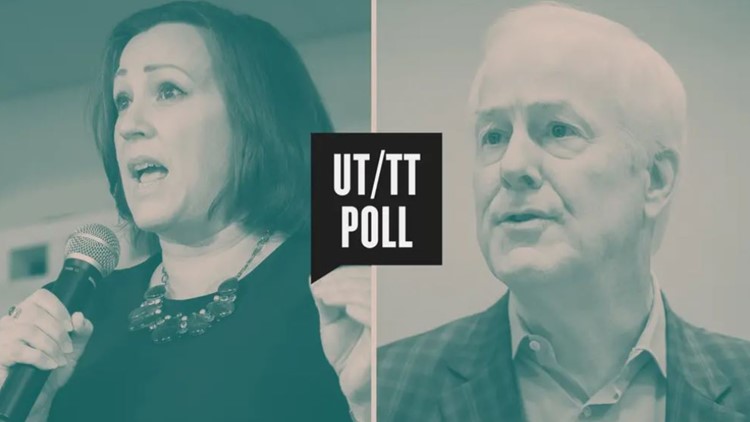This story originally appeared in The Texas Tribune.
U.S. Sen. John Cornyn leads Democratic challenger MJ Hegar by 8 percentage points in his reelection bid, according to the latest University of Texas/Texas Tribune Poll.
The poll found 50% of likely voters in Texas prefer the Republican incumbent, while 42% favor Hegar. Kerry Douglas McKennon, a Libertarian, attracted the support of 3%.
In the state’s presidential race, where President Donald Trump is leading former Vice President Joe Biden 50%-45%, there is a marked gender gap: Men favor Trump by 16 percentage points, while women favor Biden by 5 percentage points. Taken together, that amounts to a 21-point difference in support. In the Senate race, however, the gap barely exists: Men favor Cornyn by 8 percentage points, and women favor Cornyn by 4 percentage points.
And in a generic race for Congress — voters were asked whether they’d favor an unnamed Republican or an unnamed Democrat in a race for their own congressional district — Republicans had a 7-percentage-point advantage.
“It’s not like Cornyn is blowing out Hegar, but the Cornyn race and then the generic battle for Congress really look more like party [affiliation] is reasserting itself,” said Daron Shaw, co-director of the poll and a professor of history at the University of Texas at Austin. He called the presidential race a referendum on the president, with different results than might be expected for a typical contest based on party.
Hegar, who hasn’t held public office, isn’t as well known as Cornyn, who was first elected to statewide office in 1990 and was elected to the Senate in 2002. More Texas voters viewed her positively than negatively — 33% said they have a favorable opinion of her, while 24% had an unfavorable one — and 43% registered no opinion at all.
Cornyn was rated positively by 38% of voters, and negatively by the same percentage. What’s more, 24% of Texas voters, even after the years of seeing his name on the ballot, don’t report having any real impression of him.
Voters aren’t as well acquainted with Hegar as with her opponent, said James Henson, co-director of the poll and head of the Texas Politics Project at UT-Austin.
“Her fate, even more than others, is going to be pretty tied to the presidential race. She’s right there under the race,” he said. “She does have 50% of independents, but 88% of Trump voters are with Cornyn, and 82% of Biden voters are with Hegar.”
Compare Cornyn’s job approval ratings with Ted Cruz, the state’s junior U.S. senator and a former presidential candidate. Only 12% of Texas voters said either that they have a neutral or no opinion about Cruz, while 46% reported a favorable opinion and 42% said they had an unfavorable opinion.
Texans gave both senators higher marks than the institution where they serve. A majority — 60% — have a negative opinion of Congress, while only 20% said they approve of the job Congress is doing.
The University of Texas/Texas Tribune internet survey of 1,200 registered voters was conducted from Sept. 25 to Oct. 4 and has an overall margin of error of +/- 2.83 percentage points. The margin of error for results from 908 likely voters is +/- 3.25 percentage points. The numbers in charts might not add up to 100% because of rounding.
Disclosure: The University of Texas at Austin has been a financial supporter of The Texas Tribune, a nonprofit, nonpartisan news organization that is funded in part by donations from members, foundations and corporate sponsors. Financial supporters play no role in the Tribune's journalism. Find a complete list of them here.
Reference: UT/TT Poll, October 2020, Summary (day 1)
The Texas Tribune is a nonpartisan, nonprofit media organization that informs Texans — and engages with them – about public policy, politics, government, and statewide issues.



